 Sobral, Brazil implemented multiple learning assessments as part of its successful education policy reforms. Copyright: Shutterstock
Sobral, Brazil implemented multiple learning assessments as part of its successful education policy reforms. Copyright: Shutterstock
Students in the Brazilian municipality of Sobral have made remarkable progress in foundational learning, surpassing national trends. Systematic learning assessments and the accountability they foster are central to this success. Let’s take a closer look at Sobral’s education reform.
In 2005, student learning outcomes in Sobral lagged behind the national average. Yet, through the right policy reforms and targeted interventions, Sobral not only reversed this trend but also significantly accelerated learning, even after adjusting for learning losses due to the COVID-19 pandemic.
A model for education reforms
Sobral's education reforms have become a model for other sub-national governments in Brazil, including its state, Ceará. The reform package in Ceará focused on financial incentives for municipalities to improve literacy outcomes in early primary grades, technical assistance to municipal school networks to strengthen literacy instruction, municipality autonomy and decentralized management of primary and lower secondary education, and establishing monitoring systems to track education outcomes, including student learning. Students have benefited from these systemic reforms, resulting in elevated standards of educational services conducive to their academic achievements.
Figure 1. Change in education quality index (IDEB) scores in grade 5 for Brazil, the state of Ceará, and the municipality of Sobral.
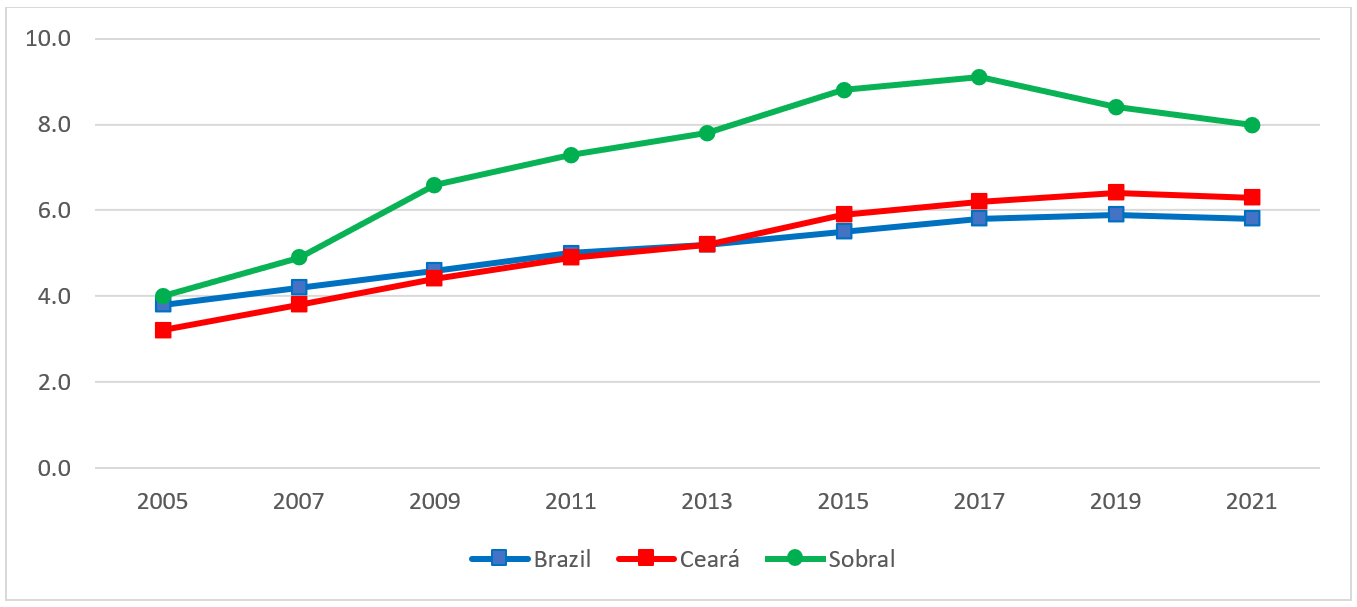
Figure 2. Change in education quality index (IDEB) scores in grade 9 for Brazil, the state of Ceará, and the municipality of Sobral.
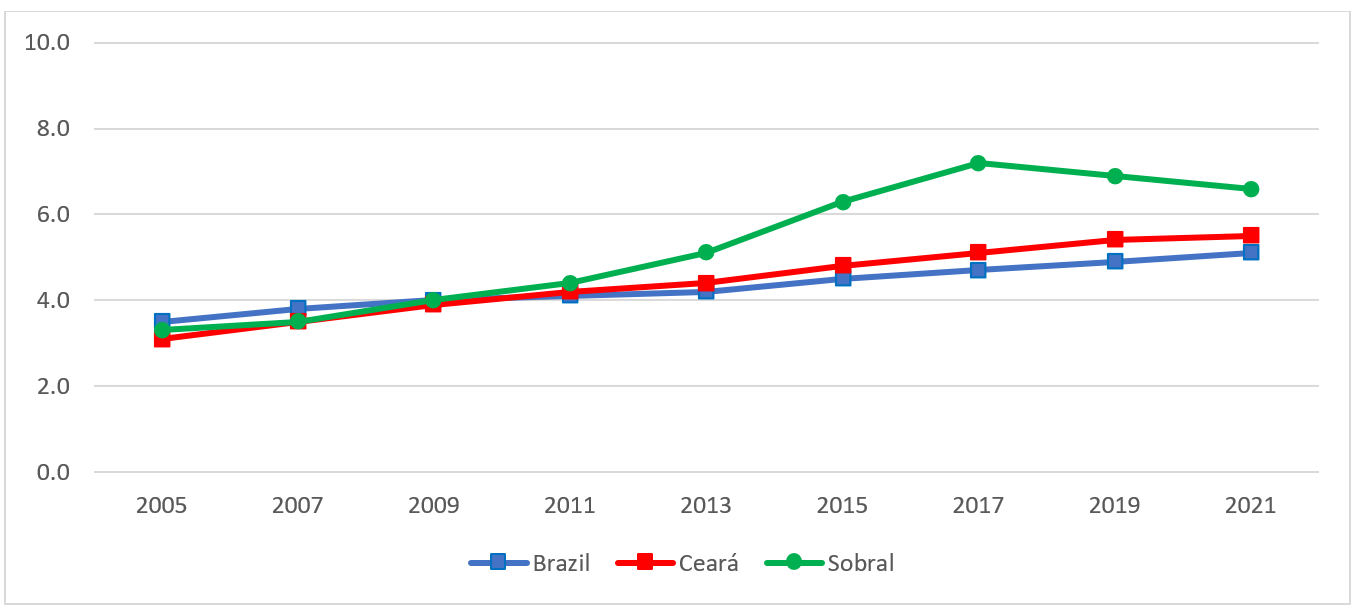
A cornerstone of success has been the implementation of multiple learning assessment activities to understand what students know and can do, and the effective use of assessment results in improving learning outcomes. In Sobral, learning assessments are used to monitor students' literacy and numeracy skills, adjust instruction, and provide supplementary learning resources and remedial education for students in need.
Learning assessment results are also utilized to set learning targets for schools, ensure accountability for continuous improvement, and tailor in-service training for school leadership. Furthermore, assessment results are used to provide financial incentives to high-performing teachers and schools, allocate additional financial support for schools not reaching specific targets, and hold officials from the municipal department of education accountable for poor performance.
How does Sobral's learning assessment system work?
Sobral employs various learning assessments to monitor learning progress for different purposes.
1. Classroom assessments. All schools use formative classroom assessments to continuously monitor student learning, provide feedback to students, and coordinate with literacy and numeracy specialists to assist with remedial education for students in need. Teachers are guided on how to use the results of classroom assessments to modify their instruction to meet students at their ability level, address student misconceptions, and focus teaching on areas where students require support. Teachers and students also receive materials, including textbooks, teacher guides, and lesson plans that include activities to assess student understanding.
2. Municipality-level large-scale assessments. Sobral conducts census-based assessments twice a year to inform about students' progress in foundational literacy and numeracy skills. Schools and teachers receive a report with individualized information about each student's progress and additional guidance on expected learning targets to be reached by the end of the academic year. Schools must act on these results to ensure students reach these targets.
3. State-level large-scale assessments. Since 1992, Ceará has conducted an annual, census-based literacy and numeracy assessment. Top-performing schools receive financial awards from the state government, and those lagging also receive grants for improvement. These assessments enable monitoring and comparing student learning progress over time, which is important to inform whether Ceará and its municipalities show learning gains, stagnation, or losses from one assessment round to the next.
4. Federal-level large-scale assessments. Since the late 1980s, Brazil has conducted national assessments to monitor learning levels in language, mathematics, and, more recently, the sciences. These results are used to compute a school-level quality indicator for all public schools to promote accountability (see Figures 1 and 2). The National Assessment of Basic Education (SAEB) includes context questionnaires to understand the impact of additional factors on student achievement. SAEB also allows for temporal comparability of results to monitor learning progress over time.
Table 1. Learning assessment types in Sobral and their key differences
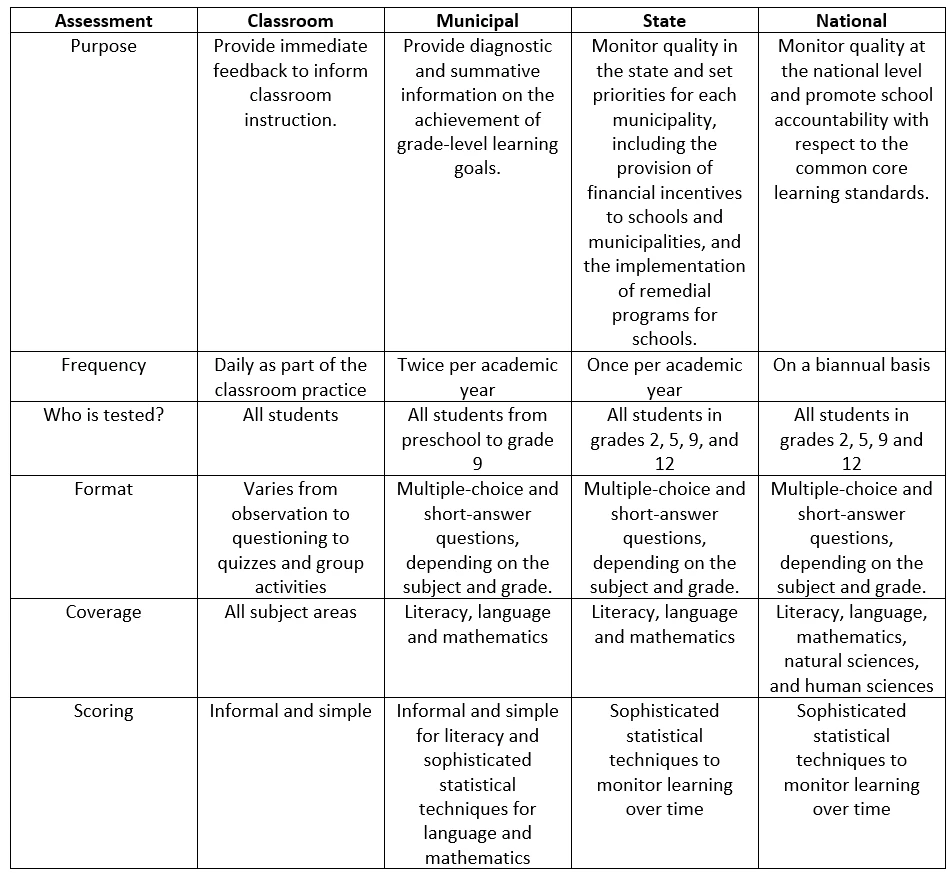
In addition, Brazil participates in regional and international assessments and carries out high-stakes national exams. These assessments also provide additional information about student learning outcomes.
Regional and international assessments. Brazil participates in cross-national studies to obtain comparative information on student achievement, including the Program for International Student Assessment (PISA), Comparative and Explanatory Regional Study (ERCE), Progress in International Reading Literacy Study (PIRLS), and Trends in International Mathematics and Science Study (TIMSS).
High-stakes exams. The National High School Examination (ENEM) is used to monitor high-school learning, admit students into federal public universities, and provide an input for the higher education scholarship program. Given the exam’s relevance, Sobral also conducts an exam preparatory course open to all youth living in the city.
Leveraging assessment results for quality improvement and accountability
Sobral places significant emphasis on learning assessments for continuous improvement and accountability, utilizing the results to make informed decisions and promote activities aligned with the broader goals of the education system. In this sense, these assessment activities help Sobral set clear learning targets for the local education system, guide the development and revision of teaching and learning materials, inform the professional development needs of teachers, and support remedial education and extracurricular activities for students who need additional assistance.
Moreover, the case of Sobral demonstrates how effectively using assessment results can cultivate a culture of accountability within an education system. Teachers, school principals, and policymakers in Sobral are held to high standards to achieve specific learning targets and are supported when they fail to meet specific learning targets. This accountability framework also includes rewarding teachers for outstanding performance by their students through bonuses and recognizing performing teachers through public events to make the teaching profession more attractive.
While other education systems may not directly replicate Sobral’s experience, one important lesson is to develop an assessment system that continuously monitors learning and uses data to improve student learning outcomes. Policymakers from other countries should also recognize the importance of tailoring assessment systems to their unique contexts to implement learning assessment activities effectively.
This blog was produced with support from the Foundational Learning Compact, a World Bank multi-donor umbrella trust fund for early childhood, primary and secondary education.
To receive weekly articles, sign-up here

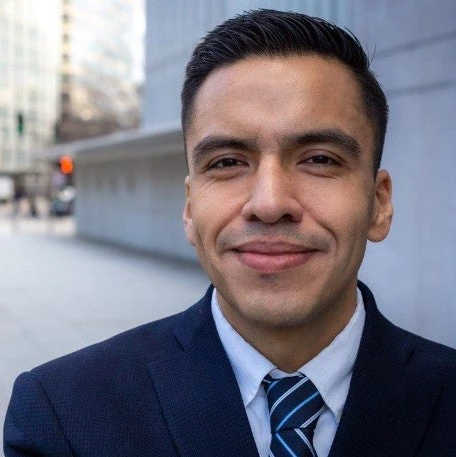
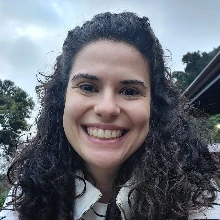
Join the Conversation